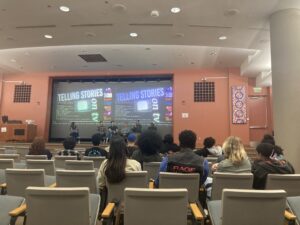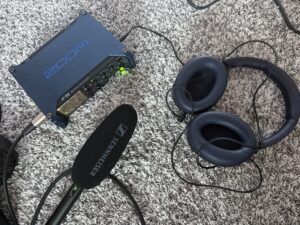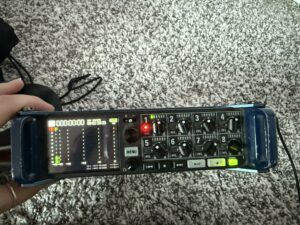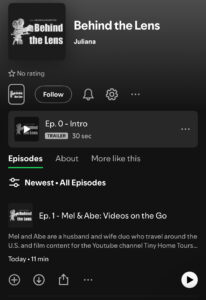Week 2: Pre-interviews, Sound Equipment, and a Podcast Release!
Hey everyone, welcome back to my senior project blog for week two!
Over spring break, I attended a two-day screenwriting camp at UTSA. SAY Sí, my site placement, and my on-site mentor, Alex Ramirez helped to coordinate the screenwriting camp, alongside the former Director of the Media Arts Studio At SAY Sí, current Assistant Director of the Film and Media Studies Program at UTSA, and potential interviewee, Guillermina Zabala Suarez. At the camp, the instructors went over some storytelling basics and then we, the students, wrote our original loglines. A logline is a two-sentence summary of a story’s premise meant to hook the audience.
Then we were split into five different groups and tasked with creating a pitch deck based on one of our group members’ loglines. At the end of day two, each group presented their pitch to Alex Ramirez, Guillermina Zabala Suarez, and Jennifer Smith (Professor of Instruction in Film & Media Studies at UTSA). They chose the winning pitch who would get to present their pitch/story to a group of Hollywood screenwriters. Unfortunately, my group did not win, but we did get to hear more from the screenwriters and ask them general questions because, after the winning group’s presentation, there was a “Tips for TV Screenwriting” panel with the visiting Hollywood writers. The Hollywood screenwriters on the panel were John Herrera, Nina Fiore, Raymond Arturo Perez, Tian Jun Gu, and Brandon Childs. After the panel was over, we were allowed to ask the screenwriters more specific one-on-one questions. I used that time to introduce myself to each of the screenwriters, tell them about my project, and ask for an interview. All five of the screenwriters were willing to give me an interview! I got each of their emails to give them more details about the interview and to set up dates and times.

On Wednesday of spring break, I had a pre-interview call with Katherine Propper. The purpose of the pre-interview call was to ask her some base-level questions to get a better understanding of who she is as a person and as a filmmaker. The pre-interview call also helps me curate more in-depth questions to ask in our official interview and set a date and time for the interview. The current date for my interview with Katherine Propper is May 9th. We are still working out the time. My interview with Katherine will be the last interview I conduct for this project to ensure that I have enough time to edit her interview and release the episode on my podcast.
On Monday of this week, I checked out some of the sound equipment at SAY Sí and played around with a Multi Track Field Recorder and some Sennheiser MKE 600 microphones. To record media on the Multi Track Field Recorder there are a lot more parts required than just the field recorder and the mics. I needed XLR cables to connect the mics to the field recorder, an SD card to save the media, and headphones to listen to what I was recording. I was able to take all of this equipment home to record the intro to my podcast in a less echoey and more quiet space than SAY Sí. The intro I recorded is around 30 seconds long and explains the premise of my podcast. I recorded around 20 takes and my favorite take ended up being take 17.


On Wednesday, I ran into Guillermina Zabala Suarez at SAY Sí. We talked about scheduling an interview and now we have a pre-interview call scheduled for Monday 3/24 at 3:30 pm. On this call, I hope to get to know her better and schedule a date and time for our official interview. I also scheduled an interview with my site advisor, Alex Ramirez, for Wednesday 3/26.
Towards the end of this week, I finished cleaning up the audio of the Mel and Abe interview. I cleaned up the audio by using the Essential Sound panel in my editing software, Adobe Premiere Pro. This tool gives me around 15 options on how to tweak the audio when in the Large Reflective Room setting. The Large Reflective Room setting is the default setting in Premiere. For most of my clips, I selected Podcast Voice, to further enhance the voices of my interviewees. For the clips that had a little more background noise, I selected Clean Up Noisy Dialogue, which muffled out the traffic noises in the background of my interview.
Over the weekend, I released the first episode of my podcast! The podcast is called Behind the Lens and it is on Spotify. I released the 30-second intro clip as a trailer and the Mel and Abe interview as a full episode. I also curated the cover art for the podcast in Google Slides.


The first episode of the podcast has officially been fully uploaded! Go give it a listen by typing “Behind the Lens, Juliana” into your search bar on Spotify!
Also, here is a link to the first episode: https://open.spotify.com/episode/7DOSf4ayWNZV8MuPB9BlX5?si=6WgctIChRUuW-tAsaifXnw&nd=1&dlsi=0009d8021f0b4084
See you guys next week!

Comments:
All viewpoints are welcome but profane, threatening, disrespectful, or harassing comments will not be tolerated and are subject to moderation up to, and including, full deletion.